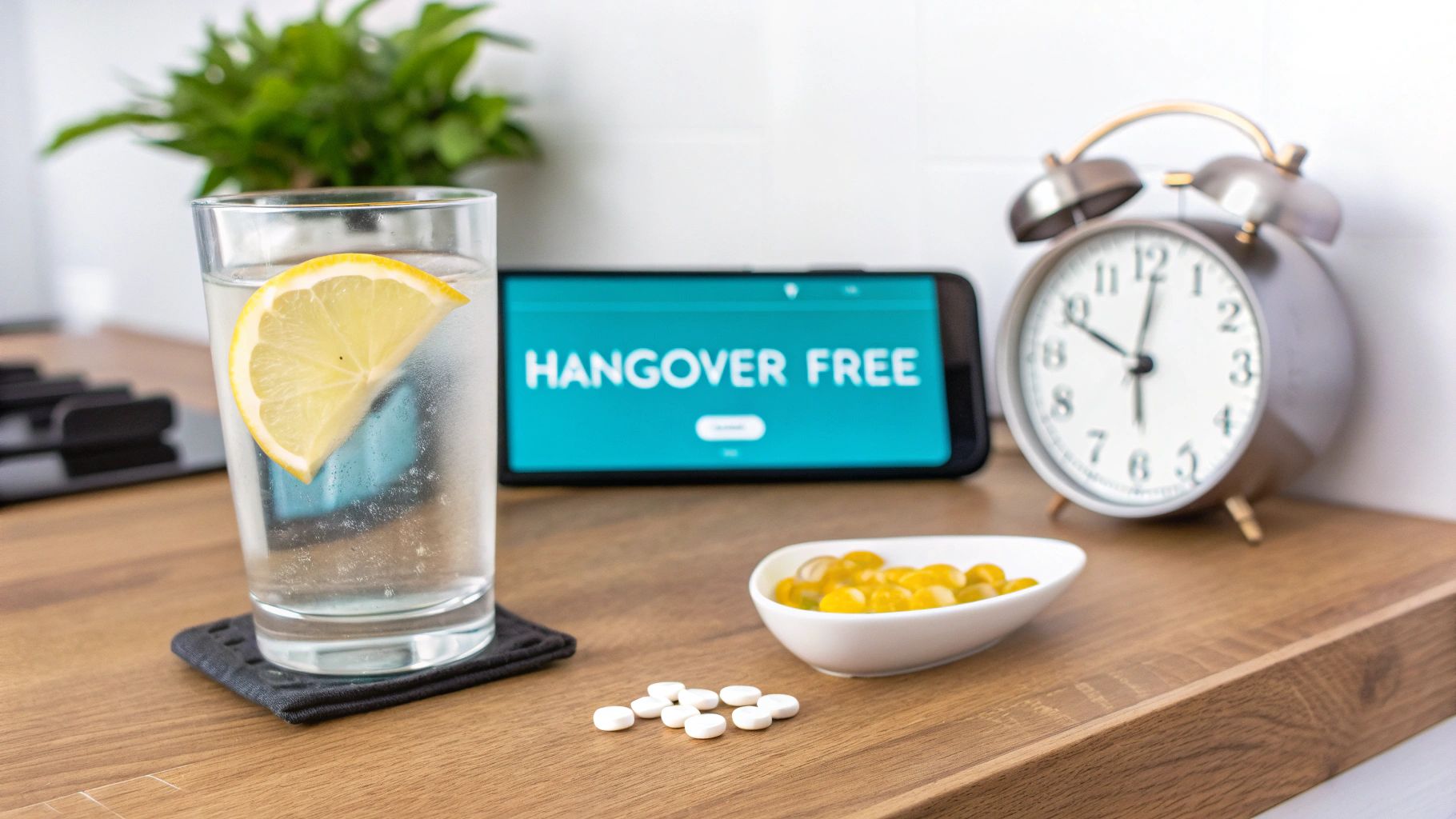

· By Annemarie
How to Avoid a Hangover After Drinking: Top Tips to Try
Waking up refreshed after a night out is totally possible
Hangovers can ruin the day after a fun night. This guide provides eight actionable strategies to help you learn how to avoid a hangover after drinking. Discover how to minimize or even eliminate those unpleasant morning-after effects by focusing on hydration, strategic eating, pacing your drinks, choosing your beverages wisely, pre-emptive supplements, quality sleep, a solid recovery protocol, and managing your alcohol tolerance. Implement these tips and wake up feeling great after enjoying a night out.
1. Hydrate During Alcohol Consumption
One of the most effective strategies to avoid a hangover after drinking is to prioritize hydration during your drinking session. This method involves consistently replenishing fluids lost due to alcohol's diuretic effect. Alcohol causes the body to expel more water than it takes in, leading to dehydration—a primary culprit behind those dreaded hangover symptoms. By maintaining adequate hydration while you're enjoying alcoholic beverages, you can significantly mitigate the severity of a hangover, or even prevent one altogether.
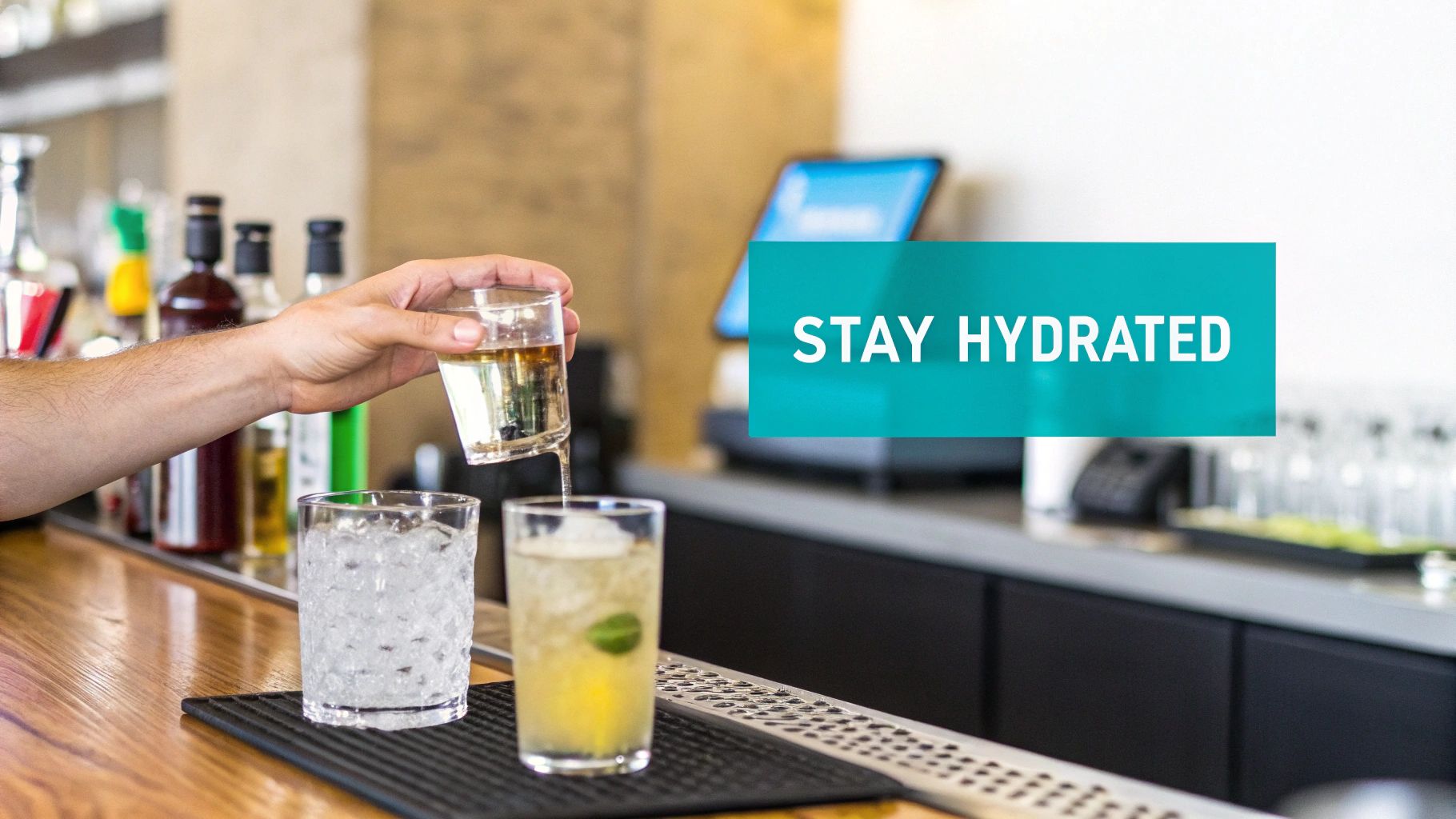
This approach deserves its place at the top of the "how to avoid a hangover after drinking" list because it tackles the root cause of many hangover symptoms: dehydration. Its simplicity and zero cost make it accessible to everyone. The core features include maintaining a one-to-one ratio of water to alcoholic drinks, continuous hydration throughout your drinking session, and even pre-hydration before you start. Pre-hydration ensures you start your evening with optimal fluid levels. Think of it as building a reservoir before the drought begins.
There are several benefits to this approach. Immediately reducing dehydration effects helps prevent the severity of morning-after headaches and other discomforts. Staying hydrated also naturally slows down your alcohol consumption rate, leading to a more controlled and enjoyable drinking experience. And, of course, implementing this strategy costs absolutely nothing.
While hydrating throughout your drinking session is highly effective, it's not a foolproof method, especially with heavy drinking. It requires discipline, especially in social settings where the focus might be less on mindful drinking. The increased fluid intake will also lead to more frequent bathroom trips. However, the pros far outweigh the cons, making hydration a crucial element of hangover prevention.
For successful implementation, consider the "water back" practice, where you request a glass of water alongside every alcoholic beverage. This approach is often normalized in Scandinavian drinking cultures. Another example is to simply sip water continuously between alcoholic drinks throughout the evening.
Here are a few actionable tips to help you stay hydrated while drinking:
- Keep a full glass of water nearby at all times: This serves as a visual reminder and easy access to hydration.
- Drink a full glass of water before your first alcoholic drink: This pre-hydration step is crucial.
- Consume 16-20 oz of water before going to sleep after drinking: This helps replenish fluids lost throughout the night.
- Add electrolytes to your water: This enhances hydration and replenishes essential minerals lost due to alcohol's diuretic effects.
Whether you're a social drinker, nightlife enthusiast, health-conscious individual, busy professional, or frequent traveler, incorporating these hydration practices can significantly improve your drinking experience and reduce the likelihood of a hangover. Learn more about Hydrate During Alcohol Consumption to explore additional rehydration strategies after drinking.
2. Strategic Food Consumption
One of the most effective ways to avoid a hangover after drinking is through strategic food consumption. This involves eating substantial meals before, during, and even after alcohol consumption. This isn't just about lining your stomach; it's about creating a buffer and providing your body with the resources it needs to process alcohol more efficiently. Food, especially options rich in protein, healthy fats, and complex carbohydrates, slows the rate at which alcohol is absorbed into the bloodstream. This happens because the food keeps the alcohol in the stomach longer, preventing rapid increases in blood alcohol concentration (BAC). Since higher BAC levels are directly correlated with hangover intensity, keeping that number lower can significantly reduce the severity of your hangover. This method is a crucial part of learning how to avoid a hangover after drinking effectively.
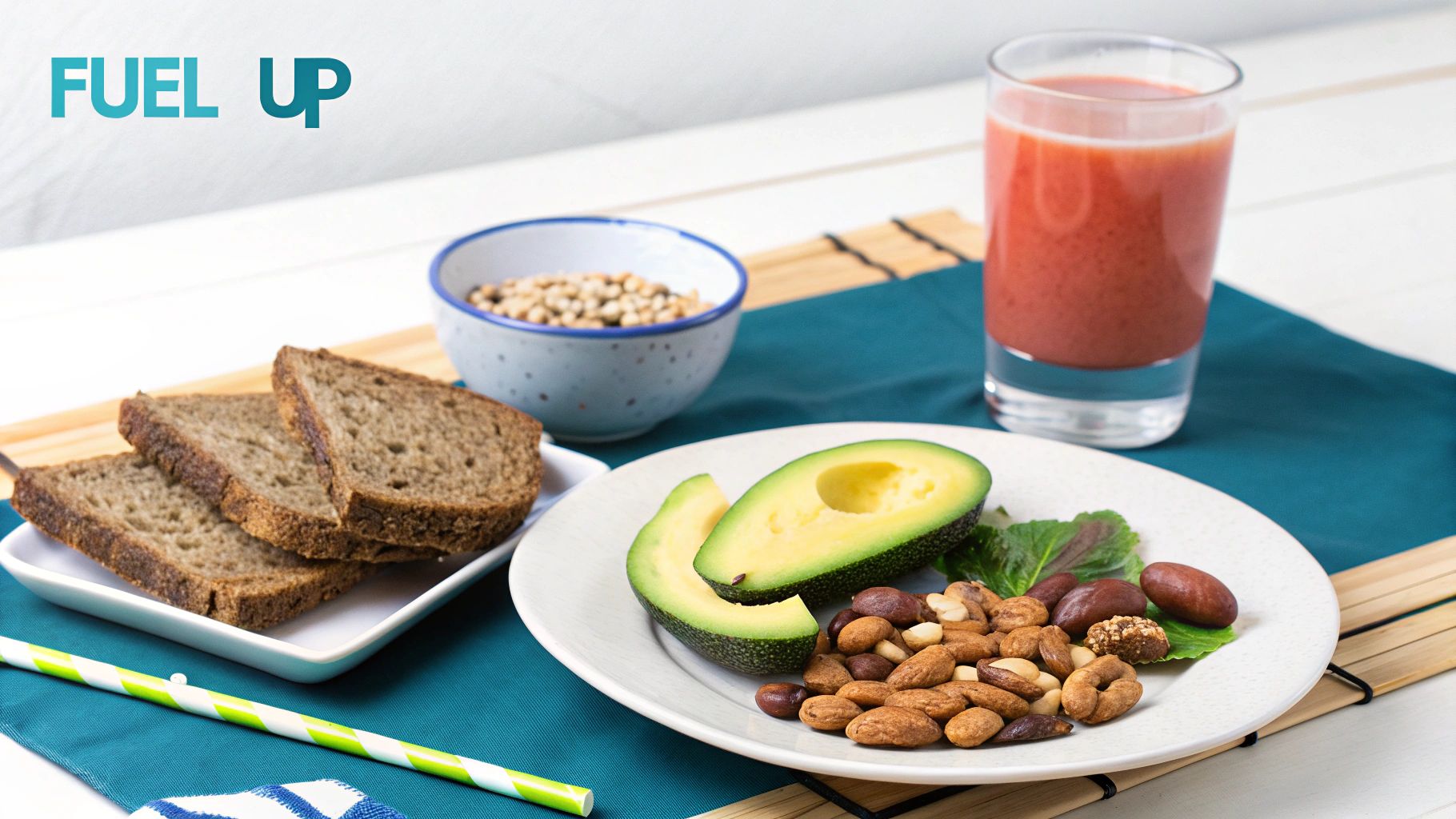
This approach offers multiple benefits. Besides slowing alcohol absorption, eating provides your body with essential nutrients that support liver function, the organ primarily responsible for metabolizing alcohol. It also helps maintain stable blood sugar levels, which can fluctuate during alcohol consumption and contribute to hangover symptoms like fatigue and nausea. Moreover, having food in your stomach can reduce nausea and general stomach discomfort often associated with drinking.
For instance, Mediterranean drinking cultures traditionally consume olive oil before drinking, providing a protective layer in the stomach. Similarly, Korean drinking tradition often includes protein-rich meals alongside alcohol, mitigating its negative effects. These cultural practices highlight the long-understood connection between food and alcohol tolerance.
Tips for Strategic Food Consumption:
- Pre-drinking Meal: Before you start drinking, consume a meal rich in healthy fats (avocados, nuts, olive oil), complex carbohydrates (whole grains), and protein (lean meats, fish, beans). This creates the initial buffer against rapid alcohol absorption.
- Snacking During Drinking Sessions: Continue to snack throughout the night. Good options include nuts, cheese, or even small sandwiches. Avoid overly salty snacks as these can worsen dehydration.
- Post-drinking Nutrition: Even after you've finished drinking, proper nutrition can aid recovery. Consider foods containing milk thistle, known for its liver-supporting properties.
Pros:
- Slows alcohol absorption rate
- Provides nutrients that support liver function
- Helps maintain blood sugar levels
- Can reduce nausea and stomach discomfort
Cons:
- May reduce the perceived effects of alcohol (if intoxication is the primary goal)
- Requires planning ahead
- Some foods may interact poorly with certain alcoholic drinks
Strategic food consumption deserves a prominent place on this list because it is a proactive and relatively simple strategy to implement. While it may not completely eliminate the possibility of a hangover, particularly after heavy drinking, it can significantly lessen its severity. Whether you're a social drinker, a nightlife enthusiast, or a busy professional, planning your meals around alcohol consumption can make a noticeable difference in how you feel the next day. This approach offers a practical way to enjoy alcohol responsibly while minimizing the unwanted consequences.
3. Pacing and Moderation Techniques
One of the most effective strategies for how to avoid a hangover after drinking revolves around pacing and moderation. This approach focuses on controlling both the rate and the total amount of alcohol you consume. By limiting your intake to roughly one standard drink per hour (the average rate at which the liver metabolizes alcohol), you prevent alcohol from accumulating in your bloodstream. This, in turn, helps maintain lower peak blood alcohol concentration (BAC) levels, which directly correlates with reduced hangover severity.
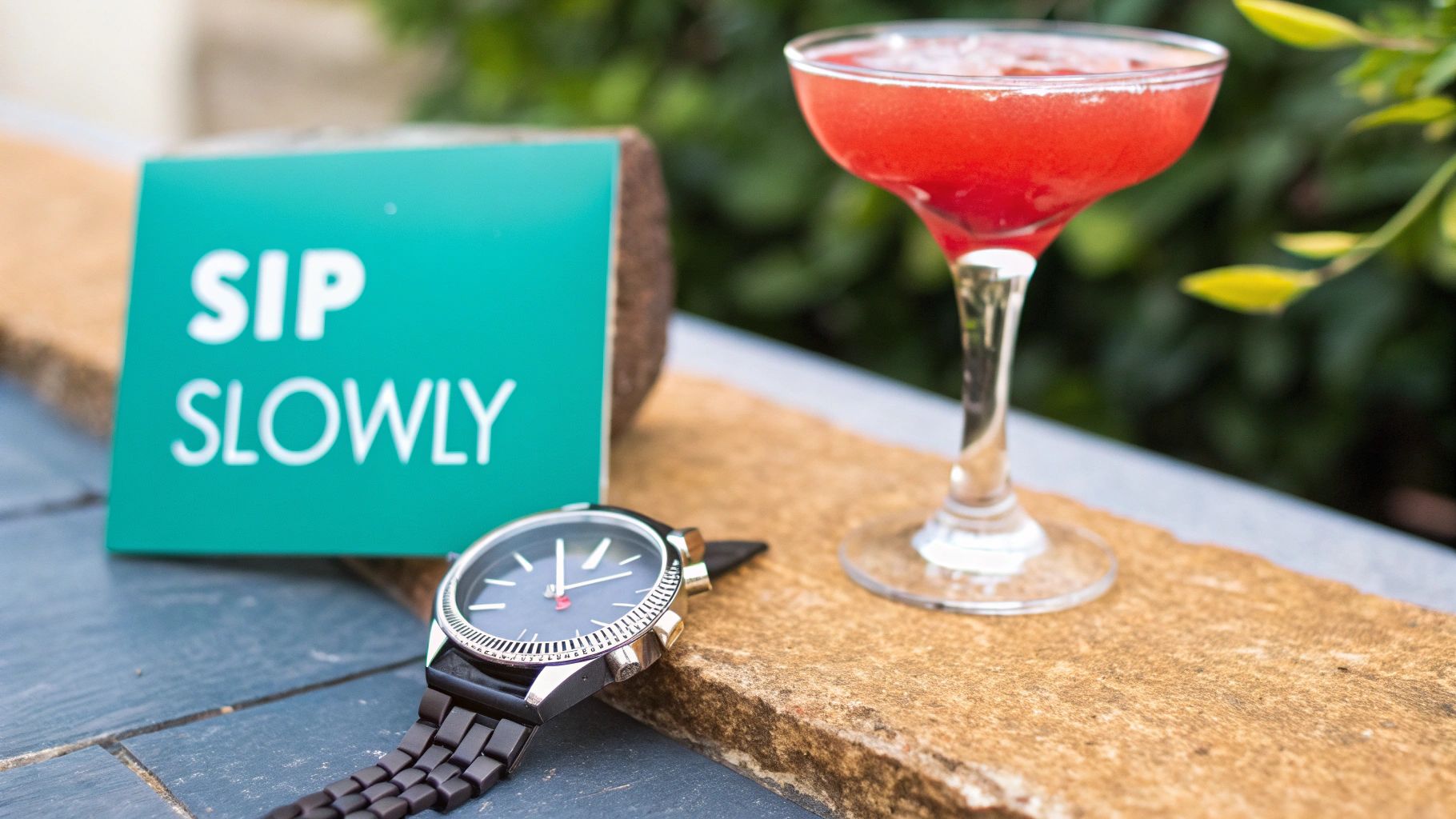
This method deserves a top spot on the hangover prevention list because it addresses the root cause of hangovers: excessive alcohol in the system. Features of this technique include adhering to the one-drink-per-hour maximum consumption rate, utilizing drink counting and tracking methods, setting pre-determined limits before drinking begins, and practicing mindful sipping rather than gulping drinks.
Examples of Successful Implementation:
- The "Alternate Drink" Method: Popular in Scandinavian countries, this involves alternating each alcoholic beverage with a non-alcoholic drink, such as water or soda. This naturally slows down the pace of consumption and keeps you hydrated.
- The "Nursing" Technique: Often seen in business social settings, this involves slowly sipping a single drink over an extended period, effectively limiting overall intake.
Actionable Tips for Pacing and Moderation:
- Use Smartphone Apps: Apps like DrinkControl and AlcoDroid can help you track your drinks and timing, providing real-time feedback on your pace.
- Choose Lower-Alcohol Options: Opt for session beers, wine spritzers, or lighter cocktails to reduce your overall alcohol intake.
- Set a Drinking Budget: Before going out, decide how much you're willing to spend on drinks. This can indirectly limit consumption.
- Announce Your Limits: Telling friends you're pacing yourself can create accountability and reduce social pressure to drink more.
- Volunteer as Designated Driver: This provides a solid, pre-committed reason for moderation.
Pros and Cons:
Pros:
- Most effective overall prevention strategy
- Maintains better decision-making throughout the drinking session
- Reduces overall toxin load on the liver
- Saves money on drinks
Cons:
- Social pressure may make adherence difficult
- Requires consistent self-awareness
- May seem less "fun" in certain social contexts
When and Why to Use This Approach:
Pacing and moderation is suitable for virtually any drinking occasion, whether it's a casual night out with friends, a business networking event, or a celebratory gathering. It's particularly beneficial for health-conscious individuals, busy professionals, and frequent travelers who need to minimize the negative impacts of alcohol and maintain optimal performance. By prioritizing mindful consumption, you can enjoy social drinking while significantly reducing the risk of experiencing a debilitating hangover.
4. Smart Beverage Selection
One of the most effective strategies to avoid a hangover after drinking revolves around making smart beverage choices. This involves understanding the role of congeners, which are toxic chemical byproducts produced during the fermentation and aging process of alcoholic beverages. These congeners contribute significantly to hangover severity. By choosing drinks with lower congener levels, you can significantly reduce your chances of waking up with a pounding headache and nausea, even if you consume the same amount of alcohol. This approach is a key component of learning how to avoid a hangover after drinking.
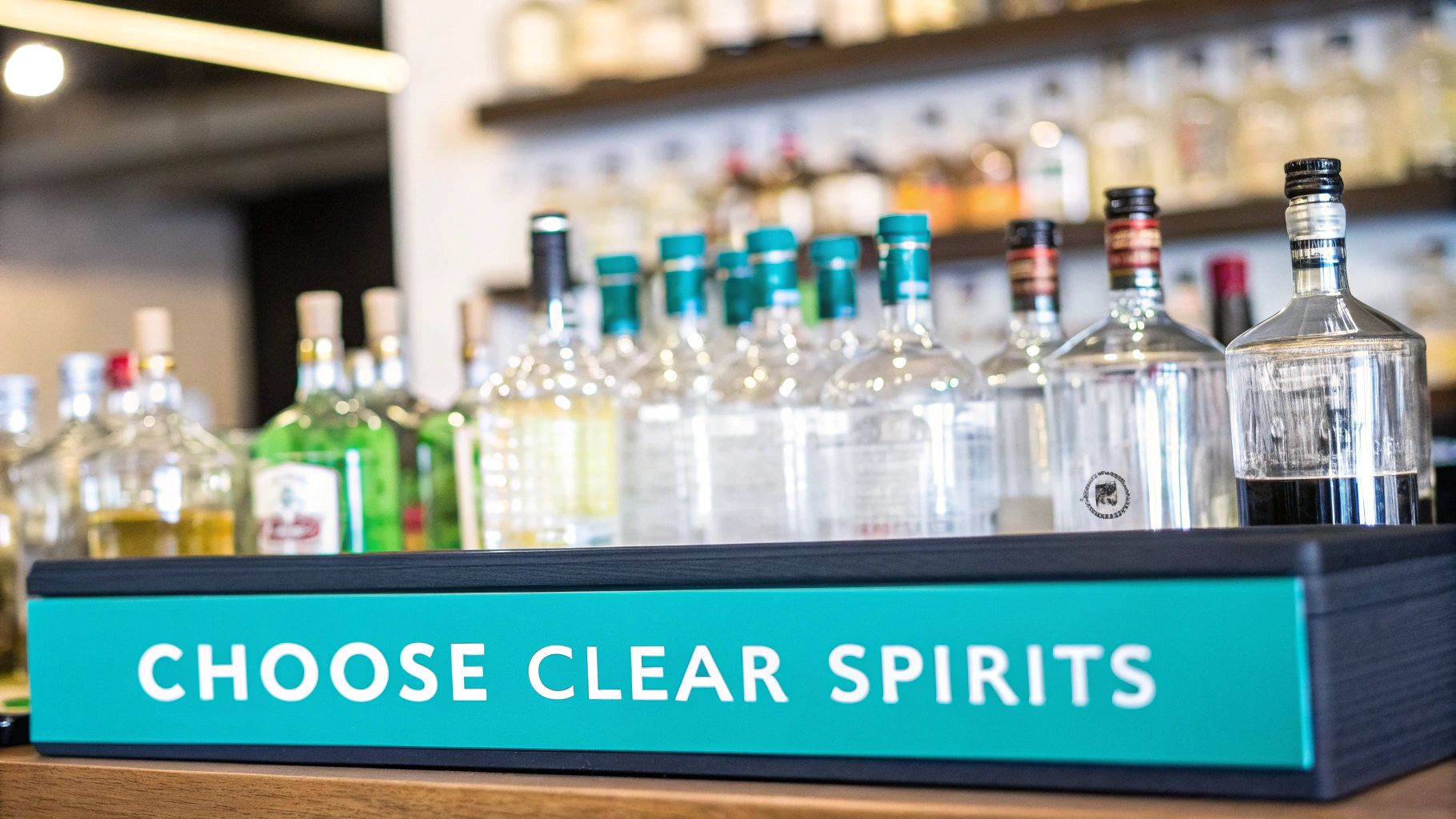
Clear spirits like vodka and gin generally contain fewer congeners than darker liquors like whiskey, bourbon, brandy, and rum. Red wine and certain beers are also higher in congeners. Making informed decisions about your beverage choices can substantially lessen the next-day symptoms. This method allows you to still participate in social drinking while minimizing the negative consequences. It also combines well with other preventative measures, creating a comprehensive approach to hangover avoidance.
For example, vodka contains minimal congeners compared to bourbon, which has approximately 37 times more. A Japanese study demonstrated that participants who consumed clear spirits experienced less severe hangovers than those who drank whiskey, even when the amount of alcohol consumed was equivalent. This highlights the significant impact of congener levels on hangover severity.
Pros:
- Can significantly reduce hangover severity even at the same alcohol consumption levels.
- Still allows for participation in social drinking.
- Combines well with other hangover prevention strategies.
Cons:
- Higher-quality, lower-congener options often cost more.
- Can limit drink selection based on individual taste preferences.
- Still requires moderation to be truly effective.
Tips for Smart Beverage Selection:
- Choose vodka or gin: These clear spirits are significantly lower in congeners compared to whiskey, bourbon, or tequila.
- Select white wine instead of red wine: White wine generally has a lower congener content.
- Opt for higher-quality spirits: Premium spirits typically undergo better filtration processes, further reducing congeners.
- Avoid drinks with multiple alcohol types: Cocktails like Long Island Iced Teas often contain a mix of high-congener liquors, increasing the risk of a severe hangover.
- Steer clear of sugary mixers: Sugary drinks can worsen dehydration and contribute to blood sugar fluctuations, exacerbating hangover symptoms.
This strategy is particularly beneficial for social drinkers, nightlife enthusiasts, health-conscious individuals, busy professionals, and frequent travelers who want to enjoy social occasions without the debilitating effects of a hangover. By understanding the impact of congeners and making conscious beverage choices, you can significantly reduce your risk and wake up feeling refreshed. Remember that while smart beverage selection plays a crucial role, moderation is still key to how to avoid a hangover after drinking entirely.
5. Pre-emptive Supplement Strategy
Want to know how to avoid a hangover after drinking? A pre-emptive supplement strategy can be a valuable tool in your arsenal. This approach involves using targeted nutritional supplements before, during, or immediately after drinking to support your body's natural detoxification processes, reduce inflammation, and replenish nutrients depleted by alcohol. Essentially, you're giving your body a boost to help it process alcohol more efficiently and minimize the negative after-effects.
This strategy works by addressing the biochemical mechanisms behind hangovers. Alcohol metabolism produces toxic byproducts like acetaldehyde, which contributes to many hangover symptoms. Certain supplements can boost the production of enzymes that break down these byproducts, while others protect liver cells from damage. Additionally, alcohol can disrupt nutrient balance and cause dehydration, which supplements can help mitigate. This multi-system support, targeting the liver, brain, and digestive system, makes this a comprehensive approach to hangover prevention.
Several studies suggest the efficacy of this method. For instance, a study on Korean pear juice demonstrated a 16-21% reduction in hangover severity when consumed before drinking. Learn more about Pre-emptive Supplement Strategy, which explores the cultural significance of these practices in South Korea. Another example is Dihydromyricetin (DHM), extracted from the Oriental Raisin Tree, which has been used in traditional Chinese medicine for centuries to alleviate alcohol-related symptoms. Modern supplement brands like Flyby, Cheers, and Morning Recovery have popularized this strategy, and Dr. Jason Burke of Hangover Heaven, a physician specializing in hangover treatment, often recommends this approach.
Here are some actionable tips for implementing a pre-emptive supplement strategy:
- B-complex vitamins: Take before drinking and the morning after to replenish essential vitamins depleted by alcohol.
- N-acetyl cysteine (NAC): Consider taking 600-1200mg of NAC 30 minutes before drinking to boost glutathione production, a potent antioxidant that helps detoxify the liver.
- Red ginseng extract: Try 1-2 teaspoons before drinking. Some studies suggest it may help reduce blood alcohol levels and hangover severity.
- Magnesium: Use magnesium supplements to address electrolyte imbalance caused by alcohol consumption.
- Milk thistle (silymarin): Consider taking this supplement to support liver function and protect against alcohol-induced damage.
Pros:
- Addresses the biochemical aspects of hangovers.
- Can reduce specific symptoms like headache and nausea.
- Some supplements have additional health benefits.
- Relatively easy to implement.
Cons:
- Scientific evidence varies in quality for different supplements.
- Potential for supplement interactions with medications. Always consult with your doctor before starting any new supplement regimen, especially if you are taking other medications.
- Can be expensive.
- Not a substitute for moderation. While supplements can help, responsible alcohol consumption is still crucial.
This approach deserves its place on this list because it offers a proactive way to minimize hangover symptoms. While it's not a magic bullet, a well-planned supplement strategy can significantly improve your post-drinking experience, making you feel better the next day. Remember to prioritize moderation and consult with a healthcare professional for personalized advice. This strategy is particularly beneficial for social drinkers, nightlife enthusiasts, health-conscious individuals, busy professionals, and frequent travelers who want to mitigate the effects of occasional alcohol consumption and maintain their well-being.
6. Sleep Optimization Strategy
One of the most effective strategies for minimizing the pain of a hangover is prioritizing high-quality sleep after a night of drinking. This involves more than just crashing into bed after your last drink. Alcohol, while initially sedative, severely disrupts normal sleep architecture, especially REM sleep, the stage crucial for mental restoration. This disruption exacerbates hangover symptoms like fatigue, brain fog, and irritability. A sleep optimization strategy, focusing on both sleep quantity and quality, can significantly reduce your suffering the next day and is a crucial part of how to avoid a hangover after drinking.
This approach works by giving your body the maximum opportunity to recover from the dehydrating and generally taxing effects of alcohol. While you sleep, your liver works overtime to process the alcohol and its byproducts. Quality sleep supports this process and helps mitigate the negative impacts.
This method is particularly valuable because it addresses both alcohol-related symptoms and the negative effects of sleep deprivation, offering a two-pronged approach to hangover recovery. If you’re interested in improving your sleep hygiene in general, prioritizing sleep is crucial for minimizing hangover symptoms. Adequate rest allows your body to recover and process the alcohol more efficiently. Resources like how to sleep better from Whelm offer science-backed tips for restful nights.
Features of a Sleep Optimization Strategy:
- Extended sleep duration: Aim for 8-10 hours, longer than your usual sleep time.
- Sleep environment optimization: This includes a cool, dark, and quiet room.
- Pre-bed hydration and nutrition protocol: Drinking water and having a small snack before bed can help.
- Sleep-promoting supplement use (where appropriate): Consider melatonin if it’s normally effective for you.
Pros:
- Addresses both alcohol-related symptoms and sleep deprivation effects.
- Can be combined with other hangover prevention strategies.
- Has additional general health benefits.
- Requires no special products or expensive remedies.
Cons:
- Can be difficult to implement in certain social situations, like when staying overnight somewhere other than your own home.
- Alcohol fundamentally disrupts sleep quality regardless of duration.
- May require scheduling flexibility the following day.
Examples of Cultural Sleep Practices:
- Finland: The tradition of sauna before bed after drinking is believed to induce deeper, more restorative sleep.
- Japan: Certain teas are traditionally consumed before bedtime after alcohol consumption to promote better sleep.
Actionable Tips for Optimizing Your Sleep After Drinking:
- Timing is Key: Allow at least 2-3 hours between your last drink and bedtime. This allows your body to begin processing the alcohol before you sleep.
- Hydrate: Keep a glass of water by the bed and sip if you wake during the night to combat dehydration.
- Consider Melatonin: If you find melatonin helpful for sleep normally, a dose of 1-3mg might aid in falling asleep. However, it’s not a guaranteed solution for alcohol-induced sleep disruption.
- Temperature Control: Keep your room cool (65-68°F/18-20°C). A cooler temperature promotes deeper sleep.
- Light and Noise: Use blackout curtains and earplugs or a white noise machine to minimize disruptions.
- Digital Detox: Avoid screens (phones, tablets, computers) for at least 30 minutes before bed. The blue light emitted from screens interferes with melatonin production.
By implementing a sleep optimization strategy as part of your plan for how to avoid a hangover after drinking, you’ll significantly increase your chances of waking up feeling refreshed and ready to take on the day, rather than battling the dreaded after-effects of a night out.
7. Morning-After Recovery Protocol
Waking up with a hangover can derail your entire day. While preventing a hangover is always the best strategy, sometimes life happens. That's where the Morning-After Recovery Protocol comes in. This approach focuses on how to avoid a hangover after drinking, specifically by addressing the symptoms once they've already set in. It's a reactive strategy that utilizes targeted interventions to minimize the severity and duration of your suffering. Learn more about Morning-After Recovery Protocol
This method works by tackling the key contributors to hangover misery: dehydration, electrolyte imbalance, inflammation, and gastrointestinal upset. By addressing these issues head-on, you can significantly improve how you feel. The protocol combines rapid rehydration with electrolytes, strategic food choices, and rest to help your body recover faster.
How it Works:
The Morning-After Recovery Protocol involves implementing several key strategies as soon as you wake up:
- Immediate electrolyte replenishment: Alcohol depletes essential electrolytes, contributing to headaches, muscle cramps, and fatigue. Replenishing these lost minerals is crucial for recovery.
- Anti-inflammatory intervention: Alcohol can trigger inflammation throughout the body, exacerbating hangover symptoms. Using a non-NSAID pain reliever like acetaminophen can help manage discomfort.
- Stomach-settling techniques: Alcohol can irritate the stomach lining, leading to nausea and indigestion. Soothing strategies can alleviate these symptoms.
- Carefully selected food intake: Choosing easily digestible foods that provide carbohydrates and protein can help stabilize blood sugar and provide sustained energy.
Examples of Successful Implementation:
Cultures around the world have developed traditional hangover remedies that align with the principles of this protocol:
- Menudo (Mexico): This spicy tripe soup is rich in electrolytes and provides a comforting, easily digestible meal.
- Haejangguk (Korea): "Hangover soup" often includes ingredients like bean sprouts, cabbage, and beef, offering hydration and nutrients.
- Full English Breakfast (UK): While seemingly heavy, this combination of eggs, bacon, toast, and beans provides protein, carbohydrates, and electrolytes.
Actionable Tips for Readers:
- Drink 16-24oz of electrolyte-enhanced water immediately upon waking.
- Take a non-NSAID pain reliever (acetaminophen/paracetamol) at the appropriate dose, if needed.
- Consume easy-to-digest carbohydrates with protein, such as toast with eggs or oatmeal with nuts.
- Try ginger tea for nausea or peppermint tea for digestive discomfort.
- Consider a very light workout or walk to increase circulation, but avoid strenuous activity.
- Implement a 20-30 minute power nap if needed in the afternoon.
When and Why to Use This Approach:
This approach is best used when you wake up already experiencing hangover symptoms. While not as effective as preventative measures, it can significantly improve your recovery. This is particularly helpful for social drinkers, nightlife enthusiasts, busy professionals, and frequent travelers who may not always be able to perfectly control their alcohol intake or implement preventative strategies. It's also a valuable tool for health-conscious individuals who want to minimize the negative impact of occasional indulgence.
Pros:
- Effective even when preventative measures weren't taken.
- Addresses multiple hangover mechanisms simultaneously.
- Can significantly shorten hangover duration.
- Most components are readily available in most homes.
Cons:
- Reactive rather than preventative approach.
- Some symptoms may persist despite intervention.
- Requires effort when feeling at your worst.
- Not as effective as prevention strategies.
The Morning-After Recovery Protocol deserves its place on this list because it provides a practical and effective way to manage hangover symptoms after they've developed. While preventing a hangover is ideal, this strategy offers a much-needed lifeline for those mornings when you need to get back on your feet quickly. The rise of IV hydration services like the Hangover Club and Revive, alongside the adaptation of athletic recovery science and Pedialyte's marketing shift toward adult recovery use, demonstrate the growing recognition of the effectiveness of this type of targeted intervention.
8. Alcohol Tolerance Management
One of the most effective long-term strategies to avoid a hangover after drinking revolves around understanding and managing your personal alcohol tolerance. This personalized approach goes beyond quick fixes and addresses the root of the problem: how your body processes alcohol. By learning your limits and respecting them, you can significantly reduce hangover frequency and severity, allowing you to enjoy social drinking responsibly and wake up feeling refreshed. This is a crucial component of learning how to avoid a hangover after drinking, especially for those who enjoy regular social occasions.
Alcohol tolerance isn't one-size-fits-all. It's a complex interplay of factors including genetics, body composition, gender, and drinking history. For example, individuals of East Asian descent often carry a genetic variation in the ALDH2 enzyme, leading to the "Asian flush" reaction and a significantly lower alcohol tolerance. Similarly, professional athletes who carefully monitor the effects of alcohol on their performance and recovery often adopt strict tolerance management practices. Recognizing your individual sensitivity factors is the first step in effective alcohol tolerance management.
How it Works:
Alcohol tolerance management involves a personalized approach to drinking based on self-assessment and awareness. This includes:
- Personal alcohol metabolism assessment: Understanding how quickly your body processes alcohol is key. This can involve tracking your drinking and observing the effects, or even considering genetic testing services that include alcohol metabolism markers.
- Recognition of individual sensitivity factors: Factors like gender, body composition, medication use, and even stress levels can influence your tolerance. Women, for example, typically require about 25% less alcohol than men of similar weight for the same effects.
- Consistent application of personalized limits: Once you've established your limits, sticking to them is crucial. This may require conscious effort, especially in social situations.
- Adaptation based on situational factors: Your tolerance can fluctuate depending on circumstances. Adjust your limits downwards when taking medications, when tired, or under stress. Be aware that an empty stomach can also lead to faster alcohol absorption and more intense effects.
Pros:
- Highly personalized and therefore more effective: Tailoring your drinking habits to your specific tolerance offers a more effective solution than generic advice.
- Builds sustainable long-term drinking habits: This method encourages mindful drinking and a healthy relationship with alcohol.
- Reduces overall health risks from alcohol: By managing your intake, you're minimizing the negative impacts of alcohol on your body.
- Increases self-awareness around drinking: This approach fosters a deeper understanding of your body's response to alcohol, empowering you to make informed choices.
Cons:
- Requires self-experimentation and tracking: Determining your limits requires careful observation and honest self-assessment.
- Genetic testing for alcohol metabolism can be expensive: While insightful, genetic testing isn't always necessary and may not be accessible to everyone.
- Social pressure may challenge adherence to personal limits: Sticking to your limits can be difficult in social settings where drinking is encouraged.
- Tolerance can change over time requiring reassessment: As we age, our tolerance tends to decrease, requiring ongoing adjustments to our drinking habits. Be aware that while tolerance can increase with regular drinking, this does not reduce your hangover risk.
Actionable Tips for How to Avoid a Hangover After Drinking with Tolerance Management:
- Keep a "drinking journal": Note the amount of alcohol consumed, the time frame, and the resulting effects. This can help you identify patterns and establish your personal limits.
- Consider genetic testing services: If you're curious about your genetic predisposition to alcohol metabolism, consider a test that includes relevant markers.
- Adjust limits downward when necessary: Reduce your intake when taking medications, feeling tired, stressed, or if you know you'll be drinking on an empty stomach.
- Recognize age-related changes: Be aware that tolerance decreases with age.
- Remember gender differences: Women generally have a lower tolerance than men.
- Don't equate increased tolerance with reduced risk: Your body may become more efficient at processing alcohol with regular drinking, but this doesn't make you immune to hangovers or the long-term health risks associated with excessive alcohol consumption.
By embracing alcohol tolerance management, you're taking a proactive and personalized approach to how to avoid a hangover after drinking. This method emphasizes self-awareness, responsible drinking habits, and long-term health, making it a valuable tool for anyone who enjoys social drinking but wants to avoid the unpleasant consequences of overindulgence.
8 Strategies to Avoid Hangovers Compared
| Strategy | Implementation Complexity 🔄 | Resource Requirements 💡 | Expected Outcomes ⭐📊 | Ideal Use Cases 💡 | Key Advantages ⚡ |
|---|---|---|---|---|---|
| Hydrate During Alcohol Consumption | Low | Minimal (water and electrolytes) | Reduces dehydration and severity of headaches ⭐⭐📊 | Social drinking where hydration is available | Immediate effect, zero cost, easy to adopt ⚡ |
| Strategic Food Consumption | Medium | Meal planning and prep | Slows alcohol absorption, supports liver ⭐⭐📊 | Before/during drinking sessions with food access | Nutrient support, reduces nausea |
| Pacing and Moderation Techniques | Medium | Self-discipline and tracking tools | Strong reduction in hangover severity ⭐⭐⭐📊 | Situations allowing measured drinking | Most effective prevention, cost-saving |
| Smart Beverage Selection | Low-Medium | Choosing quality clear spirits | Reduces hangover severity via congener avoidance ⭐⭐📊 | Social drinking with alcohol choice flexibility | Allows social participation, synergizes with other strategies |
| Pre-emptive Supplement Strategy | Medium | Supplements (cost variable) | Can reduce specific symptoms; effectiveness varies ⭐📊 | Individuals open to supplement use | Targets biochemical hangover causes |
| Sleep Optimization Strategy | Medium | Scheduling and environment control | Improves recovery through better sleep quality ⭐⭐ | Post-drinking rest periods | Addresses sleep disruption, supports recovery |
| Morning-After Recovery Protocol | Low | Common foods, hydration, OTC meds | Reduces hangover duration post-symptom onset ⭐ | When prevention was not practiced | Accessible, multi-symptom relief |
| Alcohol Tolerance Management | High | Self-tracking, possible genetic testing | Long-term reduction in hangover frequency and severity ⭐⭐⭐ | Long-term drinkers seeking personalized control | Sustainable, highly personalized |
Cheers to a Hangover-Free Future!
Nobody enjoys a hangover. This guide has provided eight key strategies on how to avoid a hangover after drinking, covering everything from pre-emptive hydration and strategic food consumption to smart beverage choices and a solid morning-after recovery protocol. We've also explored the importance of pacing, moderation, understanding your alcohol tolerance, and optimizing your sleep. Mastering these techniques empowers you to enjoy social events and celebrations without the dreaded next-day consequences. By prioritizing your well-being and making informed choices, you can strike the perfect balance between enjoying your favorite drinks and waking up feeling refreshed and ready to seize the day. Remember, preventative measures are always more effective than trying to cure a hangover after it hits.
Want an extra layer of support in your quest to outsmart hangovers? Try Upside Hangover Sticks. Formulated with a blend of natural ingredients inspired by traditional Korean medicine, Upside can be part of your pre-drinking routine to support your body’s natural detoxification process and help you wake up feeling your best. Learn more and grab yours at Upside Hangover Sticks.
